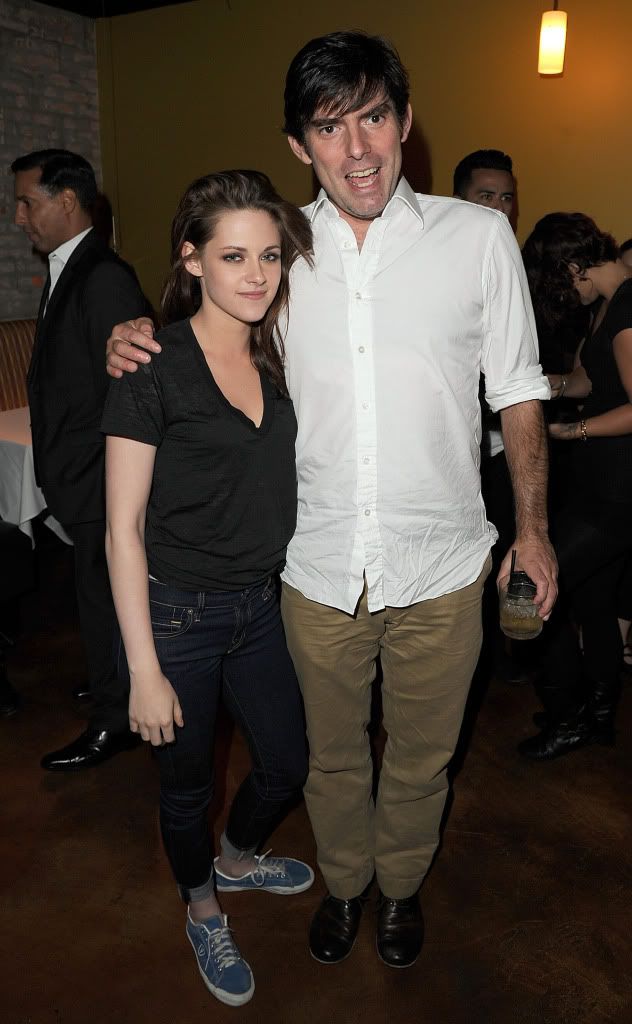onsdag 22 juni 2011
'TheDailyBeast': Why Chris Weitz Made His New Movie After 'New Moon'
From source: TheDailyBeast
Chris Weitz, known for big-budget films like ‘New Moon,’ has directed a small, personal movie about an undocumented father and son in Los Angeles.
My movie A Better Life is opening Friday against Cars 2, which is kind of like saying my mosquito is fighting an elephant. On steroids. Who’s really pissed off.
To make it worse, I have a 4-year-old son. Do you know what it’s like to have a 4-year-old son? It’s like living inside the movie Cars. Yep, I know where his entertainment dollars are going.That’s OK, though. I had better get used to our disagreeing. Nature’s common theme is for children not to get what their parents are going on about. And my movie finds its characters, at the outset, at odds.
A Better Life is about an undocumented Mexican gardener in Los Angeles and his 14-year-old son. Carlos, played by the great Mexican actor Demian Bichir, is not the guy you ask to trim your hedges—he’s the guy that the guy you ask to trim your hedges orders to trim your hedges. He works hard seven days a week to put food on the table and doesn’t have time to raise his kid on site. This, any sociologist worth his salt will tell you, is a recipe for trouble. The biggest determinant of what will make an at-risk kid lapse into the gang lifestyle is whether there is a parent at home to set them straight.
Luis, played by newcomer José Julian, goes to a crappy public school. In East Los Angeles—though we should applaud the many teachers and administrators that are working to change that situation—this is not unheard of. His girlfriend and his best friend are, as my gang- and spiritual-adviser Father Gregory Boyle would put it, knuckleheads. At home, he’s raised by the TV, which tells him that his father is a nobody because they don’t live in a big-ass house.
They are cut off from each other, and cut off from their birthright. Carlos, because he has left his country behind, and all of its traditions—something made painfully clear when father and son find themselves at a charreada, a Mexican rodeo, in the more upscale suburb of Pico Rivera. Luis, though he was born in the United States, feels that the highest he’ll be able to climb up the social ladder is to “wipe tables at Denny’s.”
“
I’ve not exactly made my bread from this sort of movie.
”
You can look it up: There are entire towns in the middle of Mexico bereft of men—they’ve all gone north. And the LAPD estimates that there are 22,000 gang members in the metropolitan area.
The gangs are there as a family of last resort for kids who are ready to say “fuck it” and embrace the nihilism that leads to jail and death. And the Migra, or Immigration, is the constant fear of every immigrant trying to make money to keep his or her family together.
Running like a vein of gold through all of this fear and anger is love. The love of parents for children; the love that compels men to cross the border to send money home to support the families they hardly ever see; the love that makes Carlos take a tremendous risk to try to lift his little duo out of poverty.
I’ve not exactly made my bread from this sort of movie. I started with pie-molestation and proceeded through a CGI-talking-animal phase with The Golden Compass before I rode the teen-vampire wave to box-office hypertrophy with The Twilight Saga: New Moon. So there was some work to be done. When I began working on this movie, I started studying Spanish. My brain rebelled—the gray matter might be custardy, but it is particularly crusty around the language center for me. Every once in a while, I would turn the radio to the Mexican stations—KRCD, KXOL, KBUE, and 101.9 La Nueva, with the redoubtable Piolín, the most popular radio host in the entire country. (Did you know that? I didn’t.) I couldn’t stand the music—formulaic wheezing and cackling, and the seemingly ever-present accordion, a German heirloom that almost negates the wonderful lager.
But what I started to realize, as my vocabulary improved, was that it was all about the lyrics; and that in the light of the lyrics, the keening sorrow of the vocals made sense. Some of these chirpy songs were about violence and power—Narcocorridos, tales of drug-runners and gunsels, and the almost unspeakable slaughter that has engulfed much of the country since President Calderón declared “war” on the cartels.
But mostly, the lyrics were all about love. Love of ones left behind, love of country left behind, love of this new country and the chance to stay, against the odds, as the cars pass us by on the corner.
Prenumerera på:
Kommentarer till inlägget (Atom)


Inga kommentarer:
Skicka en kommentar